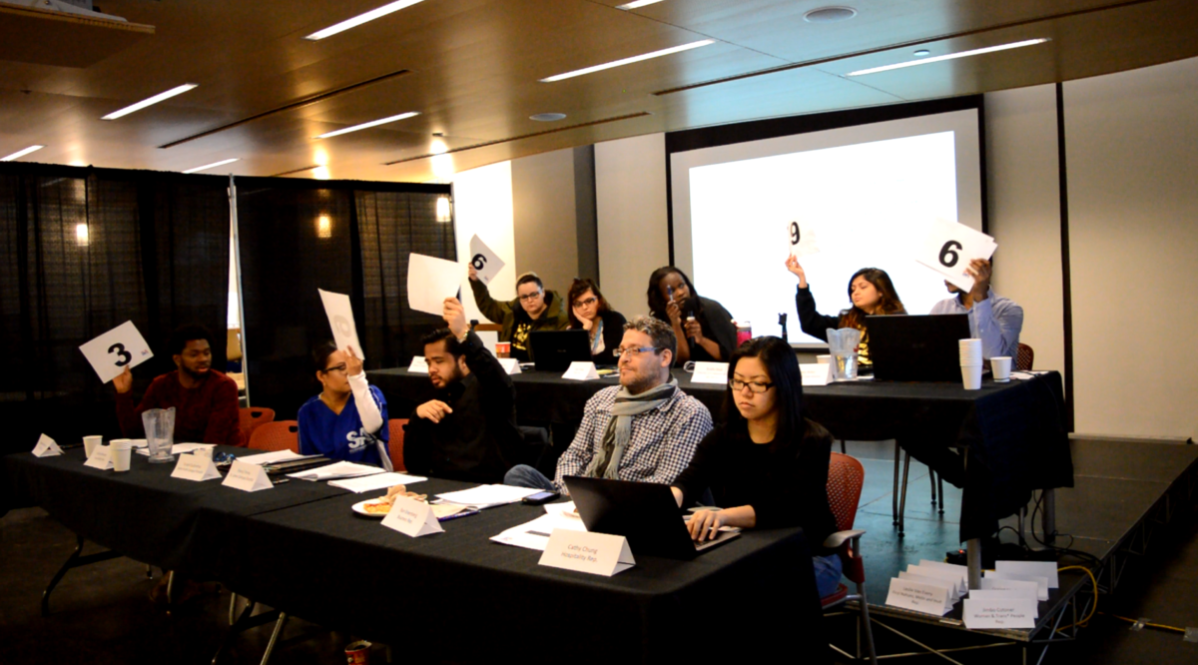Spring general meeting sees SA executives and campus directors get raises, while education and constituency reps take pay cuts
In a sparsely attended Spring General Meeting of the Student Association (SA), several changes to the bylaws passed, including a 24 per cent raise for executive positions.
Roughly 15 students showed up to the meeting, including just nine of the 20 members of the SA’s board of directors.
Under the old pay structure, executives were paid $28,500 annually based on a 40 hour work week. Under the new bylaws, the executives will make $17 an hour or $35,360 a year pro-rated.
The directors of operations and communications and internal work full-time throughout the year, while the directors of education and campus life work full-time from May 1 to Aug. 31 and part-time from Sept. 1 to April 30.
The SA funds The Dialog.
Brittney DaCosta, the SA’s director of campus life said that under the previous compensation structure, the executives weren’t making enough for what the job entailed. She hopes that the new pay will attract more students to run for the board.
“We’re not only benefiting ourselves, we’re benefiting future students,” said DaCosta.
Riddhi Modi, the SA’s director of communications and internal, believes the pay increase is modest and hopes that it will encourage students to stay on the board through the challenges of the job.
“Many of the people drop out because maybe they are not able to take the pressure, or maybe they think they’re not being paid accordingly,” said Modi. “Even if you go out for a customer service (job) you can get more than what’s here.”
SA business Rep. Ron Greenberg urged members to reject the proposed changes, and raised concerns that it was a conflict of interest for the executive committee to vote on their own wage increase.
Meanwhile, the SA’s education and constituency reps will see a 25.9 per cent decrease in their wages. They previously were paid $5,000 a year and will now make $3,705 at $14.25 an hour for five hours a week.
Carla Rudberg, a business marketing student at the college, said she was disappointed that the constituency representatives will be taking a pay cut, while the executives get a raise.
“My main issue was the fact that the executives implied that they did less work than the reps do, yet they wanted more money,” said Rudberg. She added that until the day of the general meeting, Rudberg had not seen SA executives before.
Campus directors will be getting a pay increase of 5.85 per cent, making $7,410 under the new pay system, as opposed to $7,000 previously.
Bylaws were also passed at the meeting to automatically remove directors if they don’t meet their job descriptions for a month, and to make all members of the board of directors part of the SA regardless of whether they are currently enrolled at George Brown.
However, campus directors and education representatives will still have to be registered at their campus or program during elections.
Additional bylaw changes, which come into effect on May 1, include:
- “Executive director” is renamed “general manager” for the SA’s top staffer.
- Adds a black students constituency representative to the board of directors.
- Directors must maintain a GPA of 2.0.
- Relaxes term limit of executive members from two terms total, to two terms within a five-year period starting at the last day of the end of their second term.
- Evaluating the performance of board members added to the director of communications and internal and director of operations’ job descriptions.
- Director of communications. and internal to serve as the board representative to The Dialog’s editorial committee.
- Limits the director of communications and internal and the director of operations to a maximum of one course per semester.
- Adds an additional half-pay to executive members who fill two positions through appointment.
- It will be mandatory that all minutes from the board are available on the SA’s website.
- Minimum notice required for members’ meetings increased from five days to 10 days, excluding statutory holidays.
- Number of proxy votes a member can carry at a members’ meeting is reduced from five to two.
- Elections rules moved to “Best Practices Manual” giving the board the power to change the rules by a 2/3 majority vote.
- Bans candidates from running for more than one position in an election.
- Bans the withdrawal of candidates from SA elections after the close of the nomination period.
With files from Mick Sweetman
Correction: An earlier version of this article had an incorrect annual pay for the SA’s constituency and educational representatives. At their usual hours of five per week, the reps would make $3,705 over the year.



